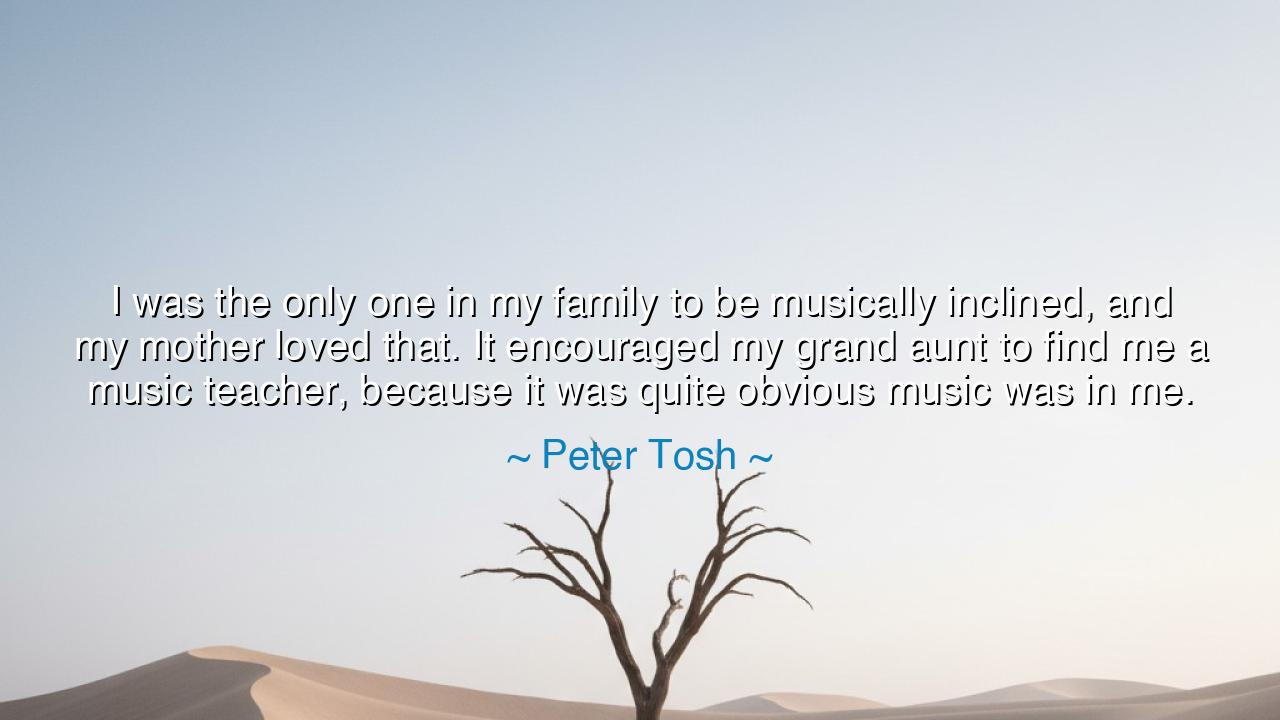
I was the only one in my family to be musically inclined, and my
I was the only one in my family to be musically inclined, and my mother loved that. It encouraged my grand aunt to find me a music teacher, because it was quite obvious music was in me.






Peter Tosh, the prophet of reggae and voice of resistance, once reflected on his beginnings with the words: “I was the only one in my family to be musically inclined, and my mother loved that. It encouraged my grand aunt to find me a music teacher, because it was quite obvious music was in me.” In this memory lies the truth of how gifts are born, nurtured, and brought forth into the world. For a talent hidden in the soul is like a seed buried in the earth — it must be recognized, cherished, and cultivated, lest it wither unseen. Tosh’s words tell us that though music was already within him, it took the love of family and the guidance of a teacher to bring it into fullness.
The origin of this story rests in the Jamaican hills where Tosh was raised, surrounded not by riches of gold or jewels, but by the wealth of rhythm and the spirit of song. He was not trained by lineage; no choir of ancestors handed down the art to him. He stood alone in his family, the solitary bearer of a divine spark. Yet, because his mother rejoiced in this difference, and because his grand aunt recognized its power, a path was made for him to receive direction. Thus he reminds us that even when a gift is rare in one’s lineage, love and encouragement can make it flourish into greatness.
History provides many such examples. Consider Wolfgang Amadeus Mozart, who as a child astonished his family with his uncanny skill at the keyboard. His father, recognizing that music was in him, devoted his life to nurturing the boy’s genius. Or think of the poet Phillis Wheatley, an enslaved girl whose brilliance with language was so evident that her masters, though bound by the cruelties of their age, gave her an education. In each case, a gift was born in isolation — not inherited, not expected — yet recognized and cultivated, until it burst forth as a beacon for the world.
Tosh’s reflection is also a reminder that music, like all true gifts, is not taught from the outside but awakened from within. He did not say that his teacher gave him music; he said music was already in him. The teacher merely provided the tools to shape what was innate. This truth is universal: the role of a teacher is not to implant greatness, but to draw it out, to refine what the Creator has already woven into the fabric of a soul. Without such recognition, many gifts lie dormant; with it, they rise to bless the world.
The lesson here is twofold. First, for those who carry a gift: honor it. Do not dismiss the passions that burn uniquely in your heart, even if no one around you shares them. If music, or art, or wisdom, or invention stirs within you, it is a sign that something divine has been entrusted to you. Second, for those who stand beside others: encourage them. A word of affirmation, a gesture of support, the effort to find a guide or mentor — these may be the sparks that ignite destiny.
What, then, shall we practice? Let us learn to be both guardians of our own gifts and nurturers of the gifts we see in others. Parents, rejoice when you see a child’s uniqueness, even if it sets them apart. Teachers, recognize that your role is not to impose, but to reveal. And as individuals, let us listen inwardly for the song, the call, the fire that is already within us, and seek the discipline and guidance that will give it strength.
Therefore, O seekers of truth, remember Peter Tosh’s testimony: “It was quite obvious music was in me.” Each of us carries within some hidden gift, perhaps overlooked by many, perhaps unlike anything in our family or community. Do not bury it. Find the ones who see it, who rejoice in it, who will help you cultivate it. And when your gift rises, let it not serve only yourself, but the world, as Tosh’s music became not only melody but a weapon of justice, a balm of healing, a cry of freedom. For the gifts of the soul are not given lightly — they are the voice of the divine, calling humanity closer to truth.






AAdministratorAdministrator
Welcome, honored guests. Please leave a comment, we will respond soon